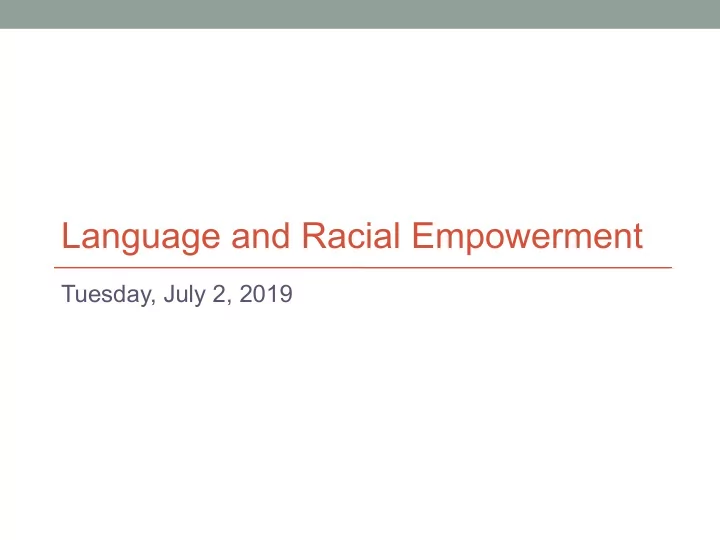

Language and Racial Empowerment Tuesday, July 2, 2019 1
2 Announcements • Don’t forget the Advancing African American Linguist(ic)s Symposium this weekend: • https://ucsbhbculing.com/special-announcements/advancingaal2019 • Office hours this week • Today, 5:00-6:00 p.m., 105 Olson • Office hours next week (via Zoom) TBA • My Zoom Room: https://ucsb.zoom.us/my/marybucholtz • Link is also on my website under Teaching • You may need to wait in the Zoom waiting room if someone else connects first • The Google Slides comment feature is now working (I hope) • Assignment 1: Please submit as .docx via Orbund only! • Thoughts on Assignment 1? • Assignment 2 now on Orbund
3 Introductions of new class members • Your name and pronouns • Undergrad/grad/faculty, home institution, field(s) and subfield(s) of interest • What is your racial and/or ethnic identity? (however you interpret these terms) • What do you hope to get from this class?
4 From racist power to racial empowerment through language • T wo ways to have an impact on the world • power : backed by structural/institutional authority; imposed from the top down • White people use their power to create and reproduce race and racism • agency : individual or collective; is often enacted from the bottom up • Racialized groups use their agency to produce empowering ways of challenging racism and creating their own meanings for race • Language is central to both kinds of processes at multiple levels: policy, representation, and practice
5 Racial empowerment through language policy • Challenge to white supremacist language policies • Native American Languages Act (1990), Esther Martinez Native American Languages Preservation Act (2006) • Elisa’s Spanish-language commencement speech (Bucholtz, Casillas, & Lee 2019) • Students’ Right to Their Own Language (see Smitherman 1995 for the history of this policy) • Issued by the Conference on College Composition and Communication (CCCC) in 1972, approved by membership in 1974 • “… We affirm strongly that teachers must have the experiences and training that will enable them to respect diversity and uphold the right of students to their own language” • “ Black students’ right to their own language has made possible all students’ right to their own language” (Smitherman 1995: 25)
6 Racial empowerment through linguistic representation • linguistic representation : scripted, planned, and/or performed use of language associated with a particular social group • In literature, scholarship, law, education, news media, entertainment media and performances, everyday social interaction • Empowering representations challenge hegemonic racist representations • Alice Walker’s (1982) The Color Purple , Gloria Anzaldúa’s (1987) “How to Tame a Wild Tongue” • Linguistic reclaiming of white public space • Smitherman’s and Alim’s use of AAE in scholarly writing • “Emphatic Blackness” on Black Twitter (Smalls 2018) • Intergenerational bilingualism in the TV show “Jane the Virgin” (Melgarejo & Bucholtz forthcoming in Spanish in Context )
7 Racial empowerment through linguistic practices in interaction • Subversion of the racial and raciolinguistic hierarchy • Reyes (2011), “Racist!” • Rosa (2019), “Pink Cheese, Green Ghosts, Cool Arrows” • Slobe (2018) on “mock white girl” • Creation, use, alignment with, and nurturing of linguistic practices indexical of ingroup identity • Languages/varieties (see Buccio 2018 on Mixtec/Tu’un Savi) • Slang and ingroup lexicon (Fung Bros. on Asian American slang) • Translanguaging • Discourses of linguistic affiliation (Davis 2016) • etc.
8 Discussion • Introduce yourself to someone near you (if you don’t know them) and discuss the following: • What examples have you encountered of racial empowerment through language? For and by which racialized groups? Consider: • Language policy • Linguistic representation • Linguistic practice
9 Empowerment and accompaniment • empowerment : struggle for self-determination by members of oppressed groups • Those who hold structural power cannot “empower” those who do not • accompaniment : support for others’ struggle for self-determination • Those who hold structural power may try to give up some of their power through accompaniment • Bucholtz, Casillas, & Lee 2016
10 Toward a less racist linguistics • accompaniment: What does linguistics as a discipline—and academia as a profession—need to do to become less racist? • empowerment: What are racialized scholars and students already doing to achieve self-determination within linguistics and the academy? • Again, consider: • Policy • Representation • Practice
11 Conclusion • Race is a tool both of racist power and of racial empowerment • Racialized groups use language to challenge racism and to create shared identities • White and racialized groups have different roles to play to end the white supremacy of linguistics and the academy
Recommend
More recommend